- Home
- Rosanne Hawke
Kerenza: A New Australian Page 3
Kerenza: A New Australian Read online
Page 3
‘Footprints!’
I groan. I should have thought of that, since we’re making them everywhere.
We walk around a clump of trees, and that’s when we see our first kangaroo, just yards in front of us. We haven’t been quiet, so it knows we are there. It sits curved over, its short front legs on the ground, and it turns to stare at us. Then it rises to its full height. It’s grey and huge, taller than the bushes. I note its long claws, its back legs, strong like a giant Jack rabbit’s.
I whisper, ‘Step back, slowly.’
‘Why?’
‘It’s wild.’ I put a hand on Kitto’s arm but I can’t move. Will it jump on us and beat us to death?
Just then there is a shout behind us. The kangaroo suddenly crouches and jumps to the side. Its tail swings around like a dragon’s a few feet from us and Kitto gasps as the animal leaps away through the trees. It’s Da who reaches us first. ‘Are you all right?’
Kitto’s face is shining. ‘Of course, Da. Wasn’t it wonderful?’
Jacob joins us then. ‘That was an old man kangaroo. They can split you down the middle like a sheep carcass with those claws.’ He sounds disappointed we didn’t get split.
I shudder, but Kitto laughs. ‘It eats grass. Why would it attack us?’
‘You still need to be careful,’ Da says. ‘Wild animals can attack if they’re defending young.’
The only wild animals we had in Cornwall were rabbits, foxes, badgers and moles. Nothing giant like a kangaroo.
5
It takes seven back-aching days to cut the five-mile track to the block. Even on Good Friday the men don’t stop. After a prayer in the morning we drive the dray to where we finished the night before and cut track all day. Kitto and I help the boys drag branches away, and my hands are scratched and sore by the time Kitto finds the peg with eighteen on it.
‘We’re here!’ he shouts. Uncle Malachi throws his hat in the air but I feel like crying. Nothing is different – it’s just more grey scrub.
I’m so disappointed I say, ‘Where’s the river?’ For once no one laughs at me. The men and boys stare at the thick scrub. Then Da says, ‘It will take a long time to get this land ready for the plough.’
Late that night after we’ve put up tents under some native pine trees Elowen’s asleep already but I’m not and I hear Mam weeping. ‘It’s so desolate, like lookin’ out of a window and ‘tis nothing but blackness.’ Da makes shushing sounds. ‘It feels as if God hasn’t come with us.’
Tears dribble down my face as Da moves closer to her. ‘We can’t live by our feelings, love. It will get better. Soon we’ll have a house. And the land will be covered in wheat one day. It’s a better life for the children. And they’ll have good health in the sunshine.’
‘How can we make a home for the children here?’
‘Home is where we are, Tressa. Didn’t you say so yourself when you agreed to come?’
I hear his voice murmuring in prayer and Mam quietens. So she didn’t want to emigrate, even though Da said the mine would close and our cottage would never be our own. Why did she agree? If she hadn’t we might still be in Cornwall. I clench my fists under the quilt. It’s better feeling cross than scared.
The next day is Easter Sunday, the sixteenth day of April. At breakfast I spell it out in my head as if I am writing in my scrap album. It’s also Nanny’s birthday, and I glance at Mam. She looks sad, as if she’s remembered too. ‘A new start for us, just like the first Easter,’ Da says as he gets out his accordion. We sit outside under one of the pine trees, slapping flies off our faces and singing songs. After a while Mam sings too and her voice rises with Da’s and Uncle Malachi’s. It sounds good until some magpies join in with their warbling. Harry and I giggle at their timing but Jacob glares at us. I feel like poking my tongue out at him.
There’s no land clearing today, but Da fixes our canvas house so it has walls and is easier to walk in than when it hung like a wigwam. Then he puts iron around the stove so the canvas won’t catch alight. He shows Kitto how to make the hen coop bigger too, with wooden boxes for egg laying.
Mam says we have to have a place to spend a penny – even though we have a po in the tent for night-time – so Jacob and Harry are set to digging a hole. They call it a long drop. Jacob’s not pleased. ‘I could be clearing land. Why couldn’t you and Kitto do this, Harry?’
Harry doesn’t answer – he’s too busy whistling a tune – but Uncle Malachi does. ‘It’s Sunday – no clearing on the Lord’s Day.’ By Jacob’s scowl I can tell he thinks digging a long drop is just as much work as clearing land.
Elowen has the job of cutting pieces of newspaper. We usually put full pages of newspaper on a hook for people to rip pieces from but Elowen needs to learn to use the scissors. She cuts pages up as though she’s about to paste them in a scrap album. Then she threads the squares together on a piece of string. Kitto will have the job of putting ashes from the oven down the hole every morning.
Once the boys have finished, Da puts a kerosene ‘bucket’ without a base over the hole. He attaches a seat and erects some corrugated iron around the bucket. The door is rickety, with a huge gap underneath. I wonder how small an animal has to be to fit under it. Anything that can slide will fit. I shiver just thinking about it. The long drop is better than a bush, but when I use it I will keep my eye on that gap.
Harry says to be careful of redback spiders. ‘They like dunnies,’ he says.
‘Yeah,’ Jacob joins in, ‘if one bites you on the bottom you won’t sit down for a month. A sissy like you might even die.’
‘You’re mean,’ I say, but Kitto laughs so much over the word ‘bottom’ he gets hysterical. Mam won’t let him say it.
After Easter the men start on the clearing of the land. They take their axes and two horses: Drummer and Jess. Bobbie and Queenie will go the next day. They start on the scrub near the track. ‘We have to clear two hundred and fifty acres to get the first crop seeded when it rains in May,’ Uncle Malachi tells Da. ‘It must be strange for you, with it being autumn here.’ I think about how back-to-front Australia is and how Da used to be a miner, blowing things up, not a farmer. But looking at him today in his Australian hat you’d never know.
Kitto goes with the men to help Harry pick up sticks while Mam, Elowen and I try to turn the tents into a canvas home. Mam looks peaky, and I don’t say I heard her crying. Mam doesn’t talk about feelings to me, but I think it’s hard keeping them hidden.
We call the tent with the oven in it the kitchen tent. Elowen and I help put all the food in tins and jars. I show her what the words on the tins mean and she reads them after me, ‘Flour, sugar, salt, tea.’
‘Be mixing some whitewash,’ Mam tells me. ‘Then spread it on the hessian walls to make them waterproof. But sweep the floors first.’ I’m sick of doing jobs. It doesn’t look like it will ever rain anyway and there’s so much dust. I can even see where our heads were on our pillows last night for that’s the only white bit this morning. We’ll have to sweep the room every day if we don’t want the Mallee sand to build high enough to grow a saltbush.
‘C’mon, Elowen,’ I say after we’ve done the jobs. We keep out of Mam’s way and look at the things in our trunks we haven’t seen for six weeks. I find the book called Cornish Whiddles for Teenin’ Time. Wenna used to read it to me when I was little – stories of piskies, giants, gypsies and mermaids. She said she could only read it when I went to bed, for ‘teenin’ time’ means candle-lighting time. I pick up Alice in Wonderland and I give Eddie, my bear, a hug. Then I see my scrap album. I flick it open and Elowen points to a postcard. ‘Fanny Moody.’
‘Do you remember when Da took all of us to Redruth to her concert?’
She nods. ‘There were lots of people.’
How wonderful to sing on a stage, to cheer up people. Since she was born in Redruth, she sang for the miners for free. Ever since, I’ve been collecting her postcards.
‘There’s the tin of pictures Nanny gave us
before we sailed on the steamship,’ Elowen says. She picks up a picture of an angel and a basket of roses. Thinking about Nanny gives me a prickle behind my eyes. Then Wenna fills my mind and a tear falls.
‘Krenza? Are you sad?’ Elowen wipes my face with her handkerchief that Nanny embroidered.
I tell her to put it away. ‘I just miss Wenna and Nanny.’
‘I do too. I miss the sweet shop, our house and our bed.’ Elowen pauses. ‘And Willow. I miss her purring when I wake up.’
Her voice has grown quiet, and I tell her something Da would say. ‘We have each other.’ But it doesn’t help. Elowen sniffs and I try again. ‘Let’s decide where we’ll stick some of these pictures, and I’ll make some paste.’
‘Kerenza! Elowen!’ It’s Mam calling. We leave our things on the mattress and rush out to see what’s happening. I hope it’s not another job. Mam is standing outside the canvas kitchen talking to a man and a lady. When Mam sees us she says, ‘Here be my daughters, Kerenza and Elowen.’ She nods at us. ‘Say hello to Mr and Mrs Nietschke.’
‘Good morning,’ I murmur politely, and Elowen copies me.
‘We have a daughter your age,’ Mrs Nietschke says to me. ‘Her name is Valmai.’
I smile at her. It’s the first time here I’ve felt a lifting inside. It would be fun to have a girl my age to play with. I wonder why she didn’t come.
‘We heard the men cutting the track,’ the man says. ‘We’re just a few miles from Hampton Well.’ He has an interesting beard that disappears to a point below his chin.
‘Ya, and we have come to see if you need the help.’ Mrs Nietschke pats her basket. ‘It is difficult starting up out here, nein? We have only just finished the first part of our house and we have been here two years.’
Mrs Nietschke peers through the tent flap to the kitchen. ‘It is good you have a proper oven with burners on top for pots.’
‘We’re just learnin’ how to use it,’ Mam says. ‘‘Tis different from the slab we had in Cornwall.’ ‘Slab’ is Mam’s name for an oven.
‘In Hamburg I always cooked and I try to bake here – bread, cakes, buns, streuselkuchen.’ Mrs Nietschke sees us staring at her and she adds, ‘That is strudel cake.’
‘Just bread would be helpful,’ Mam says.
‘I have just the thing.’ She lifts a jar from her basket. ‘I have brought yeast made from potato peelings.’
Mam gives a smile and I grow warm inside. She says, ‘Thank ‘ee for visiting. ‘Ee mightn’t know what it means –’ She stops and Mrs Nietschke puts an arm around her shoulders.
‘It is the loneliness which is difficult. This is a big country, but we know with God nothing is impossible. We will make a living, ya?’
Mam blinks away tears. ‘Yes, we will,’ she says firmly.
6
Elowen and I collect chips of wood where the boys were chopping last night so Mam can fire up the oven.
‘Pack lunches for the men and boys, Kerenza,’ Mam says, puffing a bit from rolling the dough for pasties. ‘I won’t have time.’ Elowen and I spread the bread with butter and jam. I put some apples in a calico bag along with the sandwiches wrapped up in a cloth.
‘Can I go too?’ Elowen asks.
‘Not this time,’ Mam says, and Elowen’s lip wobbles. ‘Kerenza has to find where they be and I need ‘ee to help me dig out the bread tins.’
I cradle the lunch bag in my pinny and leave Mam coaxing the oven alight. It’s nice to be on my own. I have a job to do, but I pretend I’m exploring. A bird flies off from a bush and I stop. Did I hear a noise? Then I have the strangest feeling, as if someone is watching me. I listen hard but can’t hear anyone. I run to find the men.
Da, Uncle Malachi and Jacob are chopping a huge tree when I arrive. A large wedge has been cut in the tree and Uncle Malachi is chopping from the other side. There are ropes for Da to guide it. ‘Stand back,’ Da shouts when he sees me, and just then the tree falls. The horses jump away but the tree has fallen well. The men stop work to eat lunch.
Harry has measured the paddock with Kitto’s help, and attached twine to posts to guide the fencing later. ‘Our first paddock,’ Harry says while we’re eating lunch. ‘It’s hard yakka, but soon we’ll produce wheat.’
‘What’s yakka?’
Jacob hears me. ‘It’s work, you gazob.’
‘How’s she supposed to know Australian words yet?’ Harry shoots at Jacob.
Jacob’s grinning at me, but I try to ignore him. ‘How big is our land?’ I ask Harry.
‘Two thousand acres.’
My giddy aunt, my eyes must be popping. I’ve never heard of so much land. I think of all the fields of sheep and wheat in Cornwall. No one had more than a small field to work, and they never owned it. Except landlords like Mr Polglase. My sandwich is in my hand raised ready for another bite when all of a sudden it’s snatched away.
‘Kitto!’ I spin round ready to give him what for, when I gasp in shock. Towering above me is a giant bird gulping my sandwich down its long neck. Everyone chuckles, and Kitto says, ‘It’s getting friendly, but it won’t let us pat it.’
‘Is it an emu?’ I ask. ‘I didn’t realise how tall they are.’
Kitto comes over and stands close to the bird. ‘Be careful’, I say. ‘What if it bites?’
‘It bites sandwiches.’ Kitto laughs. ‘And they don’t fly.’
I’m glad birds that size don’t fly – there’d be no room in the sky. And what if they pooped on your head? The emu stalks off when it realises there’s no more food. I watch its feathers ruffle in the breeze.
Harry yawns after lunch but he goes back to picking up sticks and Kitto helps him put them in piles ready for burning. Kitto seems happy but it looks like a boring job. I collect the lunch bag and Jacob comes with me for a few yards. I steel myself in case he’s nasty.
‘You did a good job bringing the lunch and not getting lost,’ he says. I’m surprised he’s not being mean. ‘I know a better way to return to the camp.’ He raises his eyebrows at me. ‘You’ll see something interesting.’
I nod warily. His idea of interesting might not be the same as mine.
‘Go west and curve around to the camp. Don’t be too long – we’ll have underground mutton stew tonight.’
I frown at him. ‘What do you mean?’
‘We caught two rabbits.’
‘Oh.’ It sounds as if he’s making an effort to be nice. I just hope he’s right about the better way to go, for Mam will want me back soon. She’s heard how many dingoes there are around. Jacob watches me until I can’t see him for the undergrowth. A black and white fantail wags its tail at me. It chatters and flies ahead, then circles over my head. It makes me smile inside.
Soon I’m hot. The scrub is so thick I can’t even see the sun. It will take ages to get to the tents this way, and I hope Mam doesn’t worry. Why did I trust him? I try to whistle like Harry but I stop suddenly when I hear a rustle. There’s a rhythmic sliding in the undergrowth. I hold my breath as a brown reptile emerges a yard in front of me and slithers across my path. I’m frozen in panic. I didn’t see any legs – that means it’s a snake. I’ve never seen one in my life. There are hardly any snakes in Cornwall, and only one has poison to make you sick.
What if the snake comes back to get me? I can’t stand here all day like a headless goose; Mam will wonder why I’m not home. I creep forward, watching carefully where I put my feet. Then I stop; I don’t know where I am. Did Jacob hope I’d get lost?
I pray there will be an end to the thick scrub so I can get my bearings. Then a dog barks. A tremor rushes through me. A dingo? But Harry said they don’t bark. Where would a dog live here, unless it was wild? My mind grips me in a frenzy: what big teeth it will have, how ferocious, like a wolf.
Suddenly a dog jumps from the undergrowth. Not a wolf and no ordinary dog: a reddish-brown dog. It stands a few yards in front of me and barks once. I think it will attack and I try to remember what Granda taught me about dogs. Do
n’t run, don’t look scared. Was that right? Pretend to ignore it. I try to do this, but can’t dogs smell your fear? The dog runs off for a moment and reappears. Barks once again. Runs off. Granda’s dog did that when Granda had shot a duck. So I follow the dog. What else can I do?
7
The dog leads me to a clearing and I pull up suddenly.
A man with a beard covering most of his face sits by a fire, boiling water in a tin container. A small tent is erected behind him and a chestnut mare grazes by a mallee tree. I can hear Mam’s voice in my head saying, ‘Don’t be going any further, missy.’
‘Ah, Rouge,’ he says. ‘You’ve never brought a strange girl home before.’
I don’t know what to do. Perhaps he is an evil man. But Mam wouldn’t like me talking to him even if he’s not.
‘Come and have a cuppa. The billy’s boiling.’
I shouldn’t drink tea with him either. Rouge is watching me, lying on its belly and whining.
‘That won’t work with women, ol girl,’ the man says. ‘They make up their own minds if they stay or go.’
Rouge wants me to stay, and I’m intrigued. Not only by the dog, but by the man, who’s camped the night here and seems happy about it. How could he be a bad man if he has such a gentle dog? So I edge closer.
‘Sit on me swag.’ He points to it.
I gingerly sit on the other side of the fire from him. Rouge moves to lie beside me.
‘You’ve made a friend.’ The man pours black tea into two tin mugs. ‘No milk, but there’s plenty of sugar.’
‘Do you like milk?’ I’m thinking of the bucketful Mam milked this morning. Then I bite my lip for talking to him.
‘Sure as I do, but I don’t have none.’
I keep quiet about having a cow. Mam mightn’t approve.
‘Hear your menfolk clearing the land.’
I nod.
‘Don’t hold with clearing scrub.’
I wait to see what he means.
‘All this clearing and where do all the animals live then? The people who lived here before – where do they live?’

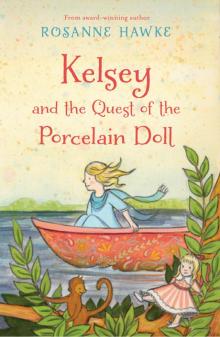 Kelsey and the Quest of the Porcelain Doll
Kelsey and the Quest of the Porcelain Doll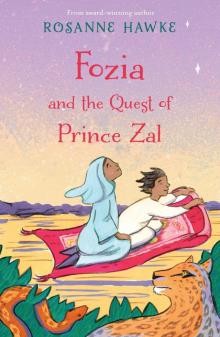 Fozia and the Quest of Prince Zal
Fozia and the Quest of Prince Zal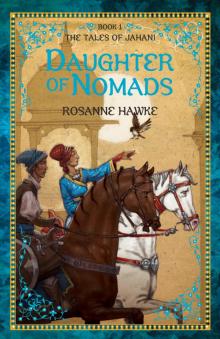 Daughter of Nomads
Daughter of Nomads The Truth About Peacock Blue
The Truth About Peacock Blue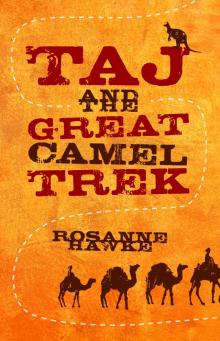 Taj and the Great Camel Trek
Taj and the Great Camel Trek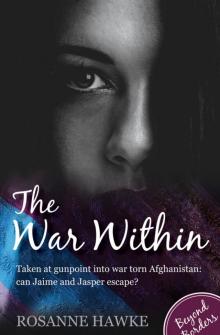 The War Within
The War Within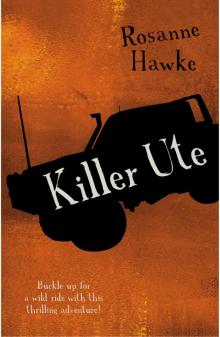 Killer Ute
Killer Ute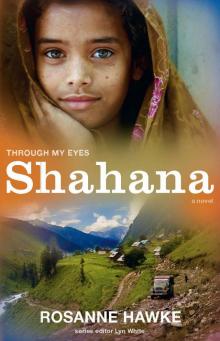 Shahana
Shahana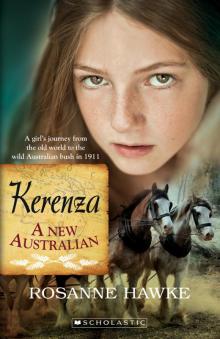 Kerenza: A New Australian
Kerenza: A New Australian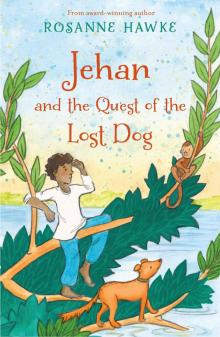 Jehan and the Quest of the Lost Dog
Jehan and the Quest of the Lost Dog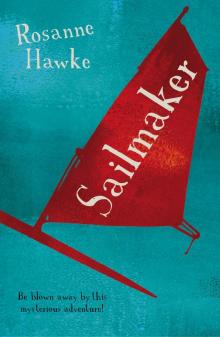 Sailmaker
Sailmaker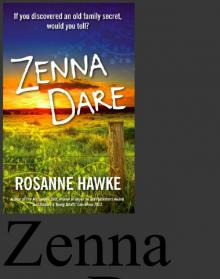 Zenna Dare
Zenna Dare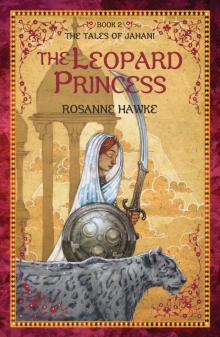 The Leopard Princess
The Leopard Princess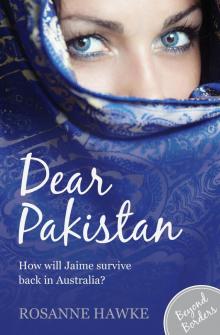 Dear Pakistan
Dear Pakistan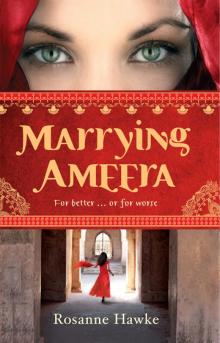 Marrying Ameera
Marrying Ameera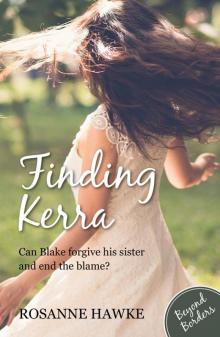 Finding Kerra
Finding Kerra Spirit of a Mountain Wolf
Spirit of a Mountain Wolf